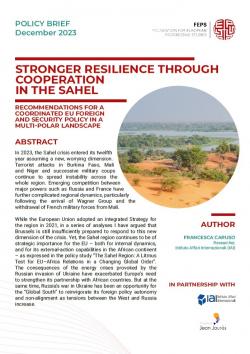Stronger resilience through cooperation in the Sahel. Recommendations for a coordinated EU foreign and security policy in a multi-polar landscape
In 2023, the Sahel crisis entered its twelfth year, assuming a new, worrying dimension. Terrorist attacks in Burkina Faso, Mali and Niger and successive military coups continue to spread instability across the whole region. Emerging competition between major powers such as Russia and France has further complicated regional dynamics, particularly following the arrival of the Wagner Group and the withdrawal of French military forces from Mali. While the European Union adopted an integrated Strategy for the region in 2021, Brussels is still insufficiently prepared to respond to this new dimension of the crisis. Yet, the Sahel region continues to be of strategic importance for the EU – both for internal dynamics and for its external action capabilities in the African continent – as expressed in the policy study ‘The Sahel Region: A Litmus Test for EU-Africa Relations in a Changing Global Order‘. The consequences of the energy crises provoked by the Russian invasion of Ukraine have exacerbated Europe’s need to strengthen its partnership with African countries. But at the same time, Russia’s war in Ukraine has been an opportunity for the “Global South” to reinvigorate its foreign policy autonomy and non-alignment as tensions between the West and Russia increase. In this third publication focused on the Sahel crisis, Francesca Caruso highlights policy recommendations for a coordinated EU foreign and security policy towards the region. Peace, security and humanitarian situations are likely to continue creating substantial challenges; hence, the EU should consider the Sahel as a litmus test for its capacity to act as a global actor for peace and democracy in a multi-polar world.
-
Details
Brussels, FEPS, December 2023, 12 p. (FEPS Policy Briefs)



